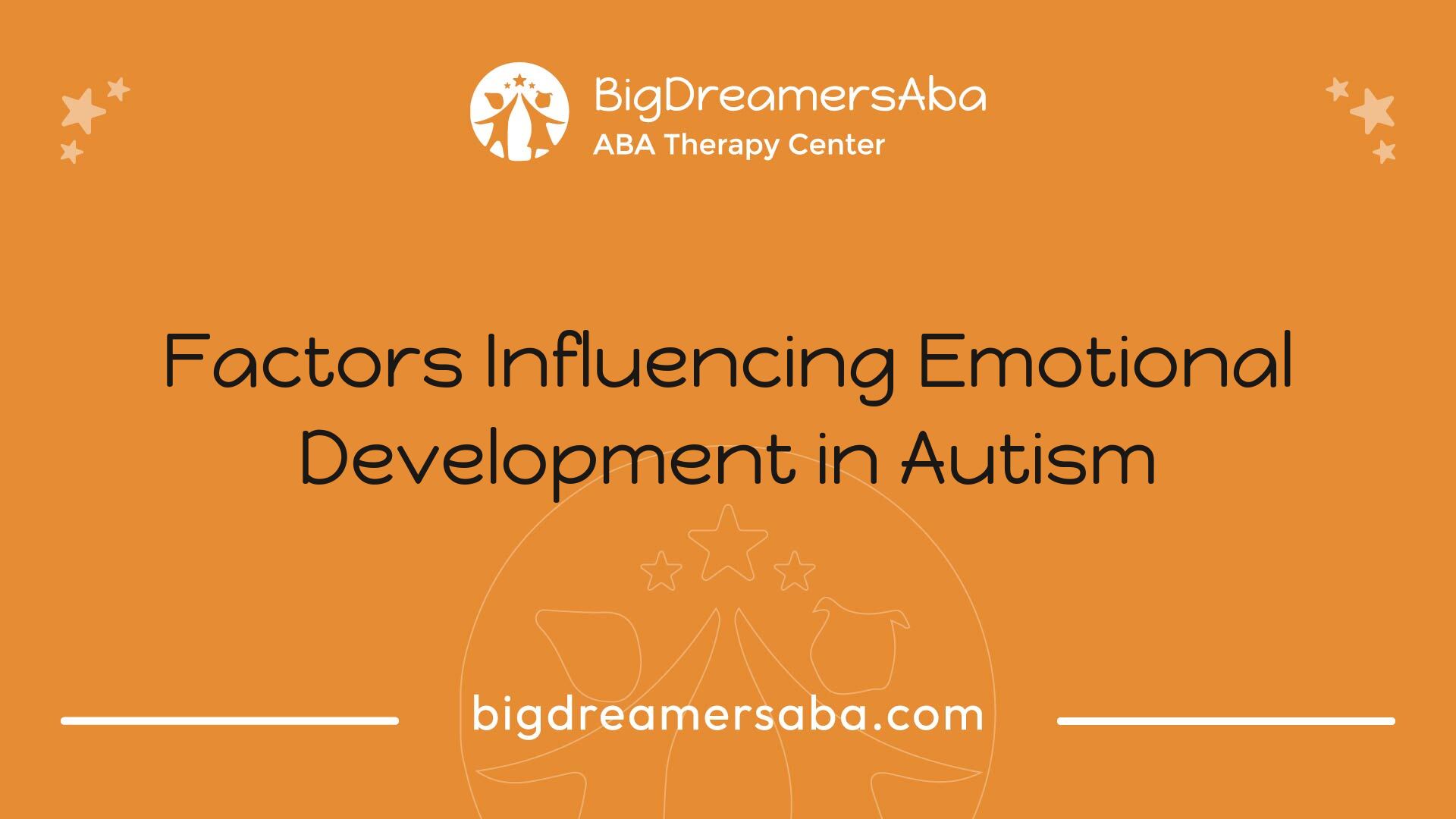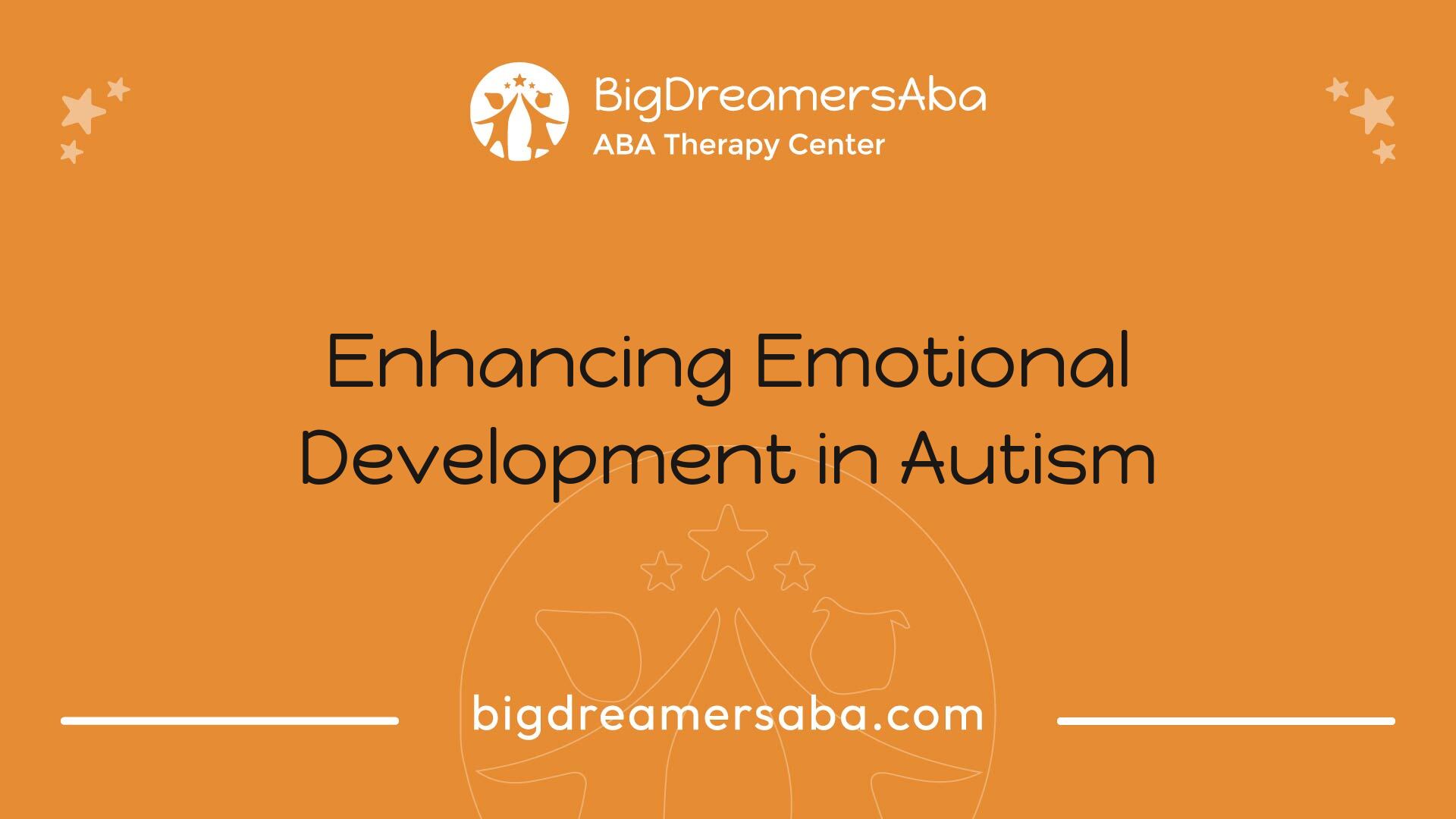The Emotional Spectrum: Autisms Influence on Development
Discover how autism affects emotional development and learn strategies to enhance emotional growth.


Impact of Autism on Emotional Development
Understanding how autism affects emotional development is crucial for supporting individuals on the spectrum. Autism can significantly influence the ways in which emotions are processed and regulated, leading to various challenges.
Understanding Emotional Dysregulation
Emotional dysregulation is a common issue faced by individuals with autism. Children and teens with autism are four times more likely to have difficulties managing their emotions compared to their peers. This dysregulation can manifest in several ways, including tantrums, hitting, yelling, social withdrawal, and even extreme silliness. The inability to appropriately express or control emotions can lead to frustration and can complicate social interactions, making it essential to address these challenges effectively.
IssueDescriptionTantrumsEpisodes of uncontrolled anger or frustration.Social WithdrawalAvoiding social interactions due to overwhelming emotions.Negative BehaviorsIncludes hitting or yelling as a response to emotional distress.Emotional OutburstsUnpredictable displays of intense emotion.
Understanding these behaviors is essential for providing proper support and intervention strategies.
Cognitive Behavioral Therapy for Emotional Regulation
Cognitive Behavioral Therapy (CBT) is being studied as a therapeutic strategy to help individuals with autism improve their emotional regulation skills. CBT focuses on modifying negative thought patterns and understanding the connections between thoughts, feelings, and behaviors. This approach can aid individuals with autism in coping with anxiety, depression, and other mental health challenges.
CBT not only encourages emotional awareness but also teaches practical coping strategies. For many on the spectrum, mastering these skills can lead to improved interactions in social settings and enhanced overall mental health. According to research, emotional dysregulation is believed to contribute significantly to mental health issues in autistic adults, with about three out of four experiencing symptoms of depression or anxiety.
For more information on supporting emotional regulation in autism, visit our articles on supporting emotional regulation in autism and helping children with autism understand emotions. These resources provide further insights into effective strategies and interventions.

Emotional Challenges Faced by Individuals with Autism
Individuals with autism encounter various emotional challenges that significantly impact their daily lives and interpersonal relationships. Understanding these difficulties is critical in addressing their needs and providing appropriate support.
Emotional Dysregulation and Mental Health
Emotional dysregulation is a prevalent issue among those with autism. Research indicates that children and teens on the spectrum are four times more likely to struggle with emotional management compared to their peers. This emotional turmoil can manifest in behavioral issues such as tantrums, hitting, yelling, social withdrawal, and extreme silliness.
Mental health repercussions are also common, with approximately three out of four autistic adults experiencing depression or anxiety. Emotional dysregulation serves as a significant contributing factor to these mental health challenges.
Emotional ChallengeImpact on Mental HealthTantrums and AggressionIncreased anxiety and potential for social isolationSocial WithdrawalHeightened feelings of depression and lonelinessExtreme Silly BehaviorPotential misunderstandings in social contexts
Emotional Regulation Difficulties in Autism
Many individuals with autism face hurdles when it comes to recognizing and understanding their own emotions. This lack of self-awareness makes it challenging to regulate their feelings, express needs, and navigate relationships.
The inability to interpret personal emotions can lead to significant dysregulation, manifesting in shutdowns or meltdowns. These physical reactions can severely impact personal relationships and hinder the ability to communicate feelings effectively.
Difficulty TypeDescriptionEmotion RecognitionChallenges in identifying one’s own emotions can lead to confusion and frustration.Expression ChallengesDifficulty expressing needs and feelings can strain social interactions.Relational StrugglesEmotional misunderstandings can create barriers to developing intimate relationships.
By recognizing the emotional dysregulation and regulatory difficulties inherent in autism, caregivers and professionals can better support individuals in managing their emotions. For more insights on supporting emotional regulation, check our article on supporting emotional regulation in autism and learn strategies for helping children with autism understand emotions. Additionally, exploring the potential benefits of autism and emotional support animals may provide further assistance in navigating these emotional challenges.

Treatment Options for Emotional Autism
Addressing the emotional development of individuals with autism is essential for their overall growth. Various treatment options can support emotional regulation and enhance interpersonal interactions. This section highlights two key approaches: behavior therapy and speech and language therapy.
Behavior Therapy
Behavior therapy is a widely used approach for enhancing emotional regulation in individuals with autism. This therapy focuses on changing specific behaviors through reinforcement strategies, aiming to reduce challenges associated with emotional dysregulation. Children and teens with autism are four times more likely to struggle with managing emotions compared to their peers without autism. Common behaviors that may arise from emotional regulation difficulties include tantrums, hitting, and social withdrawal.
Behavior therapy can help these individuals by:
Through consistent application, behavior therapy can lead to improved emotional responses and increased social engagement in daily situations.
Speech and Language Therapy
Speech and language therapy plays a vital role in aiding emotional development in individuals with autism. Many children with autism experience uneven language development, excelling in some areas while facing challenges in others. For instance, a child may rapidly decode text yet struggle with understanding the underlying meanings.
This therapy addresses communication difficulties that can affect emotional regulation by:
When children are better equipped to express their feelings and understand those of others, their emotional regulation significantly improves. For guidance on supporting emotional regulation specifically for autism, consider looking into related strategies found in our article on supporting emotional regulation in autism.
By utilizing both behavior therapy and speech and language therapy, individuals with autism can experience significant improvements in emotional development, thereby enhancing their overall quality of life. For additional resources on understanding emotions and their impact, visit our sections on can autism affect emotions and helping children with autism understand emotions.

Factors Influencing Emotional Development in Autism
Emotional development in individuals with autism can be significantly influenced by various factors. Understanding these challenges can help in supporting emotional development.
Emotional Processing Challenges
Individuals with autism often struggle to recognize and understand their own emotions. This difficulty can lead to issues with emotional regulation, impacting how they express feelings and navigate relationships. The inability to recognize emotions may result in emotional dysregulation, causing shutdowns and meltdowns.
Emotional ChallengesDescriptionRecognitionDifficulty in recognizing one's own emotions.RegulationChallenges in managing and expressing emotions appropriately.CommunicationStruggles in conveying feelings and needs effectively.RelationshipsImpact on intimacy and connection with others.
Sensory processing differences further complicate these emotional challenges. Autistic individuals may be either under-sensitive or over-sensitive to sensory input, leading to sensory anxiety. This can trigger emotional responses based on sensory experiences (Reframing Autism). Consequently, the heightened sensory information they need to process can cause delays in emotional processing, making their reactions seem slow or out of sync with non-autistic individuals (Reframing Autism).
Impact of Trauma and Abuse
Experiencing trauma or abuse can deeply affect emotional processing in individuals with autism. It can lead to the suppression or disconnection of emotions, making it challenging to process feelings in the future (Open Doors Therapy). This disconnection may exacerbate difficulties with emotional regulation and interaction with others.
Trauma EffectsDescriptionSuppressionSuppressing emotions can lead to difficulty expressing feelings.DisconnectionDisconnection from emotions makes it hard to understand them.Future ProcessingChallenges in processing emotions can linger after trauma.
Understanding the complexities of emotional processing challenges and the impact of trauma is vital for helping individuals with autism navigate their emotional development. For further insights into emotional regulation, explore our article on supporting emotional regulation in autism, or learn about helping children with autism understand emotions. Additionally, emotional support animals may provide comfort and assistance in this area, as covered in our piece on autism and emotional support animals.

Enhancing Emotional Development in Autism
Developing emotional skills can be particularly challenging for individuals with autism. Several strategies and therapies can facilitate this development.
Strategies for Emotional Development
To address emotional regulation challenges in individuals with autism, several strategies can be employed. These strategies can enhance their ability to manage emotions and improve overall emotional health.
StrategyDescriptionVisual SupportsUsing visual aids to help individuals recognize and understand their emotions.Social StoriesCreating narratives that depict social situations, providing clarity on emotional responses.Emotion Regulation TechniquesTeaching methods such as deep breathing and counting to help manage overwhelming feelings.Role-PlayingEngaging in scenarios to practice social interactions and emotional responses in a safe environment.Positive ReinforcementAcknowledging and rewarding appropriate emotional expression and regulation.
Utilizing tools and techniques from supporting emotional regulation in autism can be beneficial in strengthening these skills.
Role of ABA Therapy in Emotional Development
Applied Behavior Analysis (ABA) therapy plays a crucial role in promoting emotional development in children with autism. ABA therapy emphasizes behavior modification through positive reinforcements and modeling techniques, which are effective in helping individuals learn to recognize and express their emotions appropriately (Blossom Children's Center).
Through ABA therapy, children can develop key emotional skills, including:
As emotional regulation remains a prevalent challenge, with data indicating that children and teens with autism are four times more likely to experience difficulties managing their emotions compared to their peers, the strategies learned in ABA therapy provide essential tools to navigate these challenges. It is vital to continually support these individuals, as effective emotional development can significantly enhance quality of life.
For additional resources on understanding and supporting emotional growth, consider exploring topics such as how autism affects emotions or methods for helping children with autism understand emotions.
Recent articles

How ABA Therapy Can Help Improve Focus and Attention in Children

Why ABA Therapy is the Gold Standard for Autism Treatment
